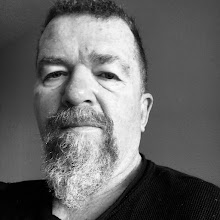Bin Laden as Goldstein

The artist is the antennae of the race. ~ Ezra Pound
We live in a curious age. One redolent of the limitless possibilities inherent to the planet’s dominant empire.
It seems like just a few years ago when a common milieu of confidence in the future of western culture was an unquestionable presumption. We could scale the deepest depths, the highest heights – step foot on the moon’s surface, even – the future was ours to attain. In the exuberance of our common self-confidence we could easily overlook the ragged, threadbare edges of our culture’s tapestry. Poverty. War. Crime. Corruption at all levels.
Now, in the aftermath of the events from September of 2001, we can begin to see the lay of the land, so to speak, with a more discerning eye. It is with this perspective in mind that we can make some curious observations pertaining to media and culture.
The English author Eric Blair, known popularly by the pen name of George Orwell, publish in 1949 a novel with the now infamous title “1984”. Two of the most famous characters from that story are the protagonist Winston Smith – the Media Insider – and the all-seeing, all knowing, yet invisible, dictator known as Big Brother. A curious artifact of this characterization is that we are never allowed to meet the person of Big Brother; only his persona is distributed far and wide, pervading every nook, cranny, private and public place, via the media of poster and telescreen. In fact, for the purposes of conducting the business of the ruling regime of Oceana, it matters little if Big Brother exists at all in the physical embodiment of an actual person; it is his ever-present persona, embedded within the Oceanic culture’s media, that actually gives Big Brother the power to rule.
We are never allowed to see the little man behind the curtain, so to speak.
Another character whose role is curiously enlightening is that of the mysterious subversive known as Immanuel Goldstein. On the surface it would appear that Goldstein is but a minor character, used to fill out the volume of the novel with the tinge of repressive reality. Yet the function served by Goldstein appears to be crucially important toward keeping the under currents of Oceanic social unrest at bay. Goldstein embodies the persona of a common enemy, toward which all citizenry of Oceana can direct their basest hatred during the daily Two Minutes Hate. He is also the usual target of blame for all news – propaganda – that might otherwise cast the Big Brother party in a negative light.
I entered into last week’s news with the thought of this Goldstein character in mind, as I was struck dumbfounded by the word that Osama Bin Laden, the mysterious, mystical leader of a worldwide Islamic terrorist movement, had in effect made a prerelease announcement for a soon-to-be-published video.
My thoughts could be summarized as such: the world’s dominant empire, which has placed men on the moon, can’t find this mysterious character, supposedly residing in the rugged mountains of northwest Pakistan, even with the best attempts of the world’s dominant military technology. Yet this same character can prerelease a video to the western media, days in advance, like perhaps what one would expect of a hip-hop artist or Hollywood movie producer.
I was dumbfounded. In awe.
It struck me then, as it has at other times since 2001, that Bin Laden serves in our culture a similar role as that served by Goldstein in ”1984”. For both Bin Laden and Goldstein it matters little if, in fact, they actually exist. Osama’s bones could be bleaching on the side of some Asian mountaintop, or his image a mere electronic apparition, and it would matter little. His is the visage of the Universal Common Enemy toward which we direct the focus of our Two Minutes Hate, the embodiment of Evil Incarnate.
Immanuel Goldstein’s value to the ruling power in Blair’s “1984” parallels Osama Bin Laden’s value to the ruling power in our own time. This observation fundamentally alters our understanding of the role, and power, of embedded media within the present culture.
In the end, Winston Smith – the Media Insider – succumbs to the interrogation of the Ministry of Truth, no longer repressed in the hidden desires of individualized rebellion, but now a True Believer. We are left with the final line in the novel: “He loved Big Brother.”
We come away with the sense that there can be no unbiased, objective media in such a world as ours. We are reminded, once again, of Werner Heisenberg’s remarkably astute maxim that the mere observation of an event changes the nature of that being observed. I would also add that the act of observation changes the nature of the observer, as well.
